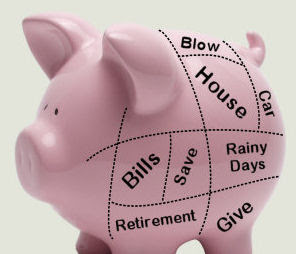From the Financial Dynamic;
Invest a little time to find out exactly how you spend your income. Add up all your expenditures for a month and multiply by 12 to get the years total for each of them.
Invest a little time to find out exactly how you spend your income. Add up all your expenditures for a month and multiply by 12 to get the years total for each of them.
Spending on lower priorities automatically interferes with your ability to attract more wealth. Spending money on things you don't highly value lowers your self-worth and demonstrates that you're unwisely managing your income. A budget can turn that habit around by motivating you to adjust your spending habits.
Most people associate budgeting with deprivation, but when you understand the real value of this simple act, you can embrace and use it to increase your wealth. You'll be grateful once you do.
Even with a budget and savings plan in place, there will be a natural ebb and flow to your finances. All of nature rises and falls, and human beings and their incomes and outflows are similar. There will be times when money flows in and times when it dries up a little, but if you allow those ups and downs to run your savings, you'll be back to breaking even again with nothing to show for your work. It's another test of your certainty and commitment. Those who pay themselves first get wealthy. Those who pay themselves last break even or go broke. And those who don't pay themselves at all can end up not only broke but even destitute, because inflation can leave them behind and unable to catch up.
You determine your own future by your present actions, so now is a great time to create the heavenly future you'd love. The difference is in how much discipline and patience you have, for these are the qualities of financial maturity. The greater you value wealth, the more disciplined you'll be.
Between the person who makes $1,200 a month and saves $400, and the millionaire who saves nothing and descends further into debt, who do you think has the greater financial maturity and the brighter financial future? One values herself and her future and is willing to pass up immediate gratification for long-term and more purposeful objectives. The other lives for the moment like a child, is unable to master either himself or his finances, and dissipates his wealth and his life. One moves toward mastery while the other remains a slave, because long-term gratification makes you money while short-term gratification costs you money. This means that those who try to get rich quickly usually don't, while those who are methodical and strategic with their savings achieve real wealth.
To your financial success!
Leo Stroobants









